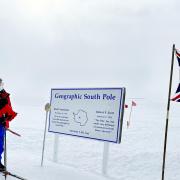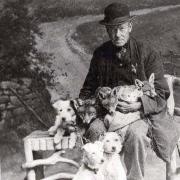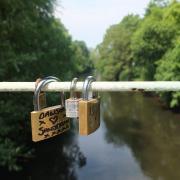Nigel Powlson talks to Ryan Cowling, Derbyshire’s Team GB wheelchair rugby player who will be taking to the field of play this month close to home...

So brutal is wheelchair rugby that it has often been called ‘murderball’ – which means that it’s not for the faint-hearted. There is nothing easy about this sport and if you want to get to the top, then you need to be fully committed to a tough training regime, day-in, day-out.
The rewards for the elite though are a chance to represent your country in the Paralympics and top tournaments around the world and that’s what drives Derbyshire’s Ryan Cowling to want to be one of the very best.
The 43-year-old from Matlock is a former serviceman who took up the sport relatively late in life but has already been part of Team GB at the Rio Paralympics. This March he will be playing against Japan, Canada and France at an event in Leicester furthering his international career in a sport he originally only took up to ‘lose a few pounds’.
He said: ‘I had done some recreational scuba diving but hadn’t really done any sport for a long time but in 2010 a friend was involved in setting up a club and he asked me to come along.

‘I had come to the conclusion at that point that I needed to be a bit more active and lose a little bit of weight. After 15 years in a wheelchair, not doing a great deal of sport, I had piled on the pounds. That was the initial reason for starting but, after a couple of years, I actually got quite good at it.
‘In 2014 I was recommended for the talent development team and that went well so I joined the Great Britain squad at the end of 2015. It was a trial for three months, and it was on my birthday that they phoned me and said that I was in the team.’
His international debut was in a friendly match vs Denmark and he was then selected to attend the Rio 2016 Test Event in February of that year. The team finished first and took home the gold.
Ryan returned to Rio in September 2016 where he made his debut as part of the Paralympic squad and was part of the team that successfully defended their title at the European Championships in 2017.

Last year he played in the inaugural King Power Quad Nations event held in Leicester and is thrilled to be back again for a second chance to take the title from current champions Japan.
He said: ‘To be chosen for a second time to represent your country is very much an honour and we shall be up against some of the top athletes in the world. We hope to get a lot of support again this year, so I want to encourage as many people as possible to come along on one of the days to cheer us on.
‘I have gone from sort of representing my country in the army to another type of representing my country. In 2012 I watched the London Paralympics and seeing the athletes was very inspiring and I did want to be part of that, but to be honest I felt I was too old.
‘I got my first call up on my 40th birthday. I’m the oldest in the squad – it’s a young man’s sport really but I hold my own and have no plans of retiring just yet.’
That’s despite admitting that his chosen sport ‘can be quite brutal at times’.
‘When my friend got me involved, he asked me to watch a film called Murderball, a documentary about the USA team. Until that point, I didn’t understand just how physical wheelchair rugby is. The contact you have between wheelchairs means you can quite easily be knocked out. It looks very dramatically physical but it’s very tactical as well.
‘They stopped calling it murderball as it wasn’t politically correct to have that name at the Paralympics.’
Despite the dangers of playing, Ryan’s family has always been right behind his sporting career. His wife Jo, and daughters Amelia and Eleanor are his biggest fans along with his father Steven.
Ryan said: ‘The highlight for me was Rio when my wife and daughters came out there with my dad and stepmum.
‘Being at the Paralympics was never anything I thought would happen. When I was chosen for the team, I can’t describe the shock as I was so new to the selection process. I had only been with the team four months, and I was there in the Paralympics representing Great Britain with my family watching me – it was really emotional. To sit on the bench just before we were about to start and see my family on the big screen above me, I just thought “Oh my God”.’
It was a relatively rapid rise for Ryan in the sport but to get to this elite level requires a massive commitment.
He said: ‘Normally I train five days a week. Great Britain training camps are on top of that. We do one or two a month at Lilleshall for three to five days. I couldn’t do it without the support of my family as I have to miss people’s birthdays and other important things because of being away training. It’s made easier because I thoroughly enjoy it and my family are right behind me.’
The only downside has been the fight for financial support for the sport.
Ryan said: ‘There was a very well-publicised funding cut after Rio and we were unfortunately one of the sports cut. That was a kick in the teeth, and we weren’t sure how we would carry on.
‘The sport has worked tirelessly since to provide its athletes with a training programme that means we can still compete with the world’s best – but it has been a struggle. We all have to help raise money to finance training camps and going to tournaments.
‘We were allowed to apply for money from an aspirational fund and were fortunate that our application was accepted, and we got a cheque for £500,000, which has helped enormously and means we can continue our plans towards Tokyo – our next big goal.
‘It has also been quite humbling to see the number of people who have dipped hands in their pockets to help us with funding and showed us that people do care and that gives us a boost to try and do well for them.’
Ryan has come a long way since the accident that resulted in him being in a wheelchair.
He was only 17 when he left home for a career in the services and his life was irrevocably changed.
He said: ‘It was a very short career unfortunately. I did my training, joined my battalion and a month after my 18th birthday was involved in an accident. We were on an exercise travelling back from Dartmoor to Salisbury Plain and close to Stonehenge when the vehicle left the road. I broke my neck and severed my spinal cord and that was that really.
‘A lot of things go through your mind and I just thought “this is rubbish”. But there comes a point when you have to not dwell on what has happened and try and get on with things. It’s tough when you are young, and I was never expecting to be in a wheelchair and living back at home, having left with no intention of going back. It was like being a young child and learning to live again.
‘But you have to crack on and make the best of it.’
Finding a sport that he has become so good at has also given Ryan a massive boost.
He said: ‘You always want to find that one thing you are really good at – no matter what it is. Some people might never find that one thing. For it to be something that also helps you in other aspects of your life is even better. Because being fit and strong helps me in my day-to-day life. I rely on my hands and arms and shoulders to get in and out of the car, getting on and off the sofa, and things like that.
‘I feel so pleased I have found that “one thing” … and I hope it continues for a good while yet.’
The King Power Wheelchair Rugby Quad Nations
Fast-paced and violent, players compete in specially-designed, manual wheelchairs and must meet a minimum disability criterion, classifiable under the sport classification rules. All competing athletes were either born with physical disabilities or have suffered illness which has affected their mobility, or else experienced life-changing injuries through accidents, including those serving in the armed forces.
Described by spectators and sports commentators as brutal, the supercharged tournament will be held at Leicester’s Morningside Arena between Friday 1st March and Sunday 3rd March, bringing together three incredible days of the world’s best ‘Murderball’ teams for this intense, elite-standard competition.
Competing, Great Britain will be up against Japan, who won the Gold medal at the World Wheelchair Rugby Championships held in Sydney last summer; Canada, currently ranked fourth in the world and France ranked seventh.
The tournament marks an important performance opportunity for Great Britain ahead of the 2019 European Championships in Denmark where Team GB will defend their title, and ahead of the World Wheelchair Rugby Challenge which will be played alongside the Rugby World Cup in Tokyo in October and involve the top eight teams in the world.
David Pond, Chief Executive Great Britain Wheelchair Rugby added: ‘We are looking forward to playing some of the best teams in the world here in Leicester and the tournament is an important step on our way to Tokyo. A big thank you to our title sponsor King Power and to the many businesses who are also supporting the event.’
For details and tickets go to www.wrquadnations.com.



























